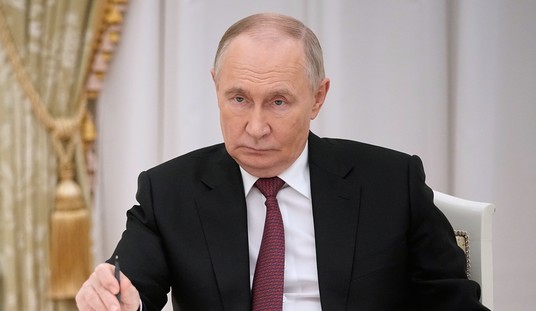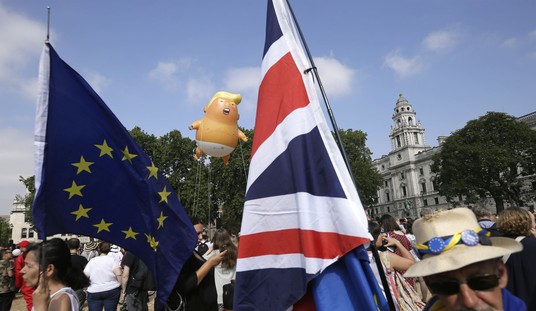The odds of this being true are around the same as the odds of Trump quitting Twitter.
But wouldn’t it be something if it was? Admit it: We all want to see a presidential tweet attacking “Justice Cuck.”
This story is newsy not because Kavanaugh’s retreating but because it makes zero strategic sense for Democrats to be pushing the idea that he is. How does falsely claiming that Kavanaugh has turned against presidential immunity *hurt* the case for confirming him? No Senate Republican will believe it, so Kavanaugh won’t lose any votes. If anything, the idea that he might pleasantly surprise anti-Trumpers by letting Mueller go after Trump is political cover for red-state Dems who want to vote for him. The lefty line is that the Republican SCOTUS nominee is a radically extreme extremist radical. Now here they are adding a critical caveat: “Except maybe when it comes to prosecuting Trump.”
My best guess at the strategy here is that they’re trying to spook Trump himself into rescinding the nomination. The odds of that are … also around the same as the odds of him quitting Twitter. But when you have no leverage to block the nomination, any longshot will do, I guess.
Democrats who interviewed Kavanaugh on Thursday said he softened his position on whether the president would have to comply with a subpoena or sit for a deposition. They also said the nominee refused to recuse himself from future legal matters involving Trump…
[Dick Durbin] said Kavanaugh appeared to walk back his claims made in a 2009 Minnesota Law Review article in which he argued that sitting presidents should not be distracted by criminal investigations or questions from prosecutors.
Durbin said that Kavanaugh explained in their meeting Thursday that he was merely suggesting that Congress should pass a law shielding sitting presidents from legal inquiries and wasn’t making any broad constitutional claim about their immunity from investigation.
“That is a big difference from what most people thought he was saying in that article,” Durbin went on to say. Is that so? I’ve written about this before, coincidentally, noting Benjamin Wittes’s analysis of the 2009 Kavanaugh piece. Here’s how Wittes described Kavanaugh’s view at the time:
These pages nowhere suggest that he has rethought his view of the law…
What the article says is that after having watched President George W. Bush up close for a number of years, serving as staff secretary and as a lawyer, Kavanaugh now believed he had previously underestimated the demands of the presidency and the dangers of distracting the president with civil and criminal matters. And he suggests as a policy matter that “Congress [should] enact a statute providing that any personal civil suits against presidents … be deferred while the President is in office” and that “Congress should consider doing the same … with respect to criminal investigations and prosecutions of the President.”
Kavanaugh never claimed, even in 2009, that the president was constitutionally immune from criminal legal process. What he claimed, as a veteran of Ken Starr’s team who’d come to regret the Clinton impeachment ordeal, was that it’d be a good idea if the president were immune. Congress should pass a law! That appears to be precisely what he told Durbin and other Dems yesterday: The business of statecraft is too important to let legal distractions bog it down, so the legislature should exempt the president from civil or criminal suit while he’s in office. (That statute could always be repealed, of course, if the president abused his immunity.) You can draw an inference from that, in fact — and at least one liberal scholar has — that Kavanaugh doesn’t think the Constitution itself immunizes the president from criminal process. If he did, he wouldn’t believe that an Act of Congress is needed to immunize him from suit.
So it’s fine for Durbin to crow, I guess, that Kavanaugh is more agonistic than his harshest critics might believe about whether the president can be subpoenaed or indicted. But (a) it’s not a change in his position and (b) again, I can’t fathom why Durbin thinks “Kavanaugh’s not a Republican hack or an executive-branch cultist” is a good argument for his side. In fact, there’s already evidence that Kavanaugh believes that the structure of the modern Office of the Special Counsel solves the separation-of-powers problems raised in Scalia’s famous dissent in Morrison v. Olson, another point in Mueller’s favor. This narrative that Trump went and found a guy to put on the Court who’d launch a seek-and-destroy mission for constitutional ways to hobble the Russiagate probe is bananas. And now, against all odds, even Senate Democrats seem to be admitting it.
And a good thing too. The new poll from Fox News, of all places, has support for Kavanaugh’s confirmation underwater at 45/46. Modern SCOTUS nominations never see heavily enthusiastic support thanks to hyperpolarization, but to have a plurality opposed is unusual. Since Senate Dems haven’t laid a glove on Kavanaugh yet, I assume the numbers are more a reaction to Trump’s fortunes lately than to the nominee himself. If you’re of the mind that a president whose closest allies are suddenly being convicted of various crimes should at least have to wait for voters to weigh in before he gets his nominee seated, you might express that view in a poll on Kavanaugh himself.








Join the conversation as a VIP Member